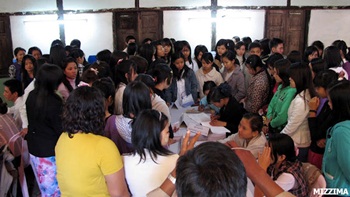An independent poll monitoring group has called for the Burmese government to open up the April 1 election to local and regional civil society groups, and not just international government monitors.
 Somsri Hananhntasuk, the executive director of the Asian Networks for Free Elections (Anfrel), made the call after she and two of her colleagues were told to leave Burma this week.
Somsri Hananhntasuk, the executive director of the Asian Networks for Free Elections (Anfrel), made the call after she and two of her colleagues were told to leave Burma this week.
“If democratization is to be sustained, and if the Myanmar government is transparent and sincere, they should allow free coverage of the election by local and regional civil society,” Somsri told the Bangkok Post in an article published on Friday.
Somsri was forced by the Burma authorities to leave the country on Tuesday. Her group arrived in Burma on March 15 to verify if the government would approve accreditation for independent observers during the by-election. The three-member team was eventually told that they were travelling on the wrong visas.
With headquarters in Bangkok, Anfrel was established in 1997. It strives to promote and support democratization at national and regional levels in Asia and supports election observation, voter/civic education, electoral reform and public awareness for good democratic governance.
After deporting the group’s members, Burmese authorities announced that they would allow two election monitors each from Asean-member countries, the U.S., the EU, Japan, China, South Korea and the U.N. Three journalists from each country will also be allowed.
The April 1 by-election will see candidates for 46 for the 650 seats in the Union Parliament – 40 for the Lower House, six for the Upper House and two for regional assemblies.
The Asean monitors have been asked to arrive in Rangoon on March 28. They will have only three days before the election to organize and familiarize themselves with election regulations and rules.
A European Union official, speaking anonymously, said that normally election monitors arrive in a country up to six months in advance of the election, in order to monitor the campaign process, the voting and the post-vote process.
In spite of the last-minute invitation, the move was seen as positive on the part of many governments. The Burmese government desperately wants the election to be certified as free and free in order to have further sanctions removed.
Suu Kyi’s National League for Democracy (NLD), which has said its election campaign so far has been confronted by a series of governmental obstacles and campaign abuses, cautiously acknowledged the move as a plus.
“We welcome the invitation of observers,” said Nyan Win, the NLD spokesman. “They should be allowed to watch and assess freely.”
The vote, which will see Nobel Peace Prize laureate Aung San Suu Kyi stand for a seat in Parliament for the first time, comes a year after a quasi-civilian government took power following the end of decades of repressive military rule.
Victoria Nuland, a U.S. state department spokesperson, said the U.S. will send monitor representatives.
“But we would obviously encourage the Burmese government to try to bring this monitoring effort as closely as they can to international standards,” she said.


